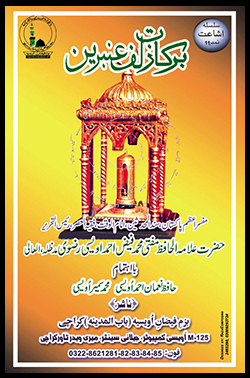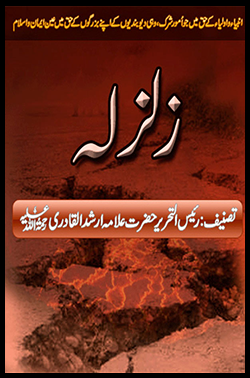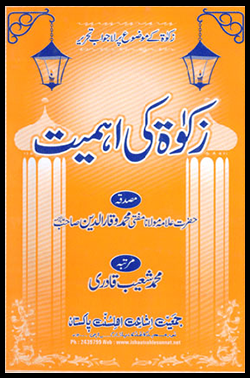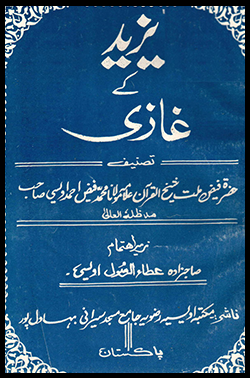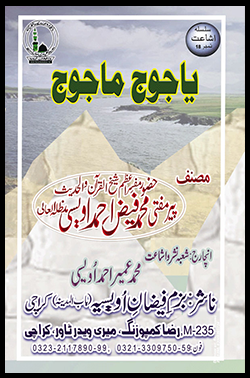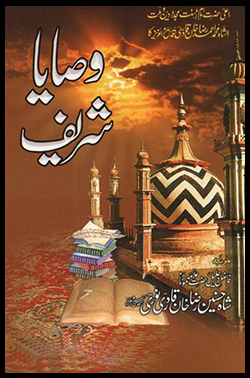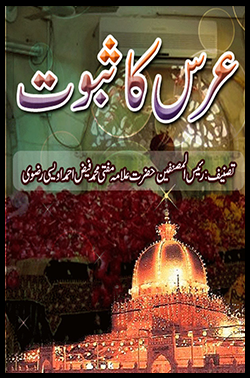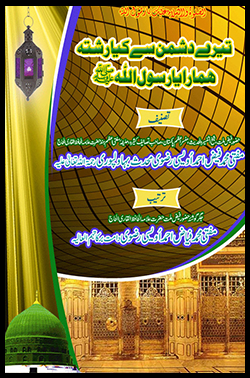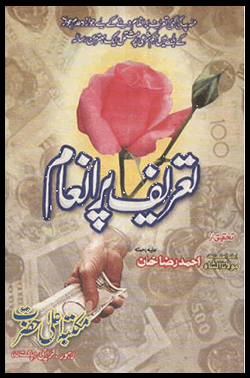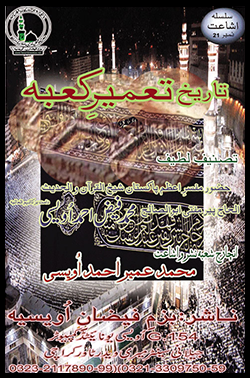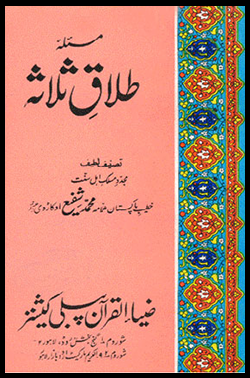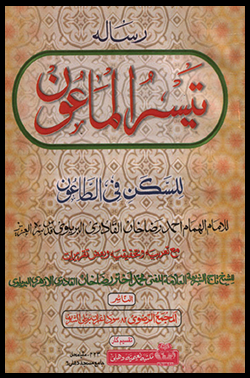Allah SubHanuhu wa Ta’ala says in the Holy Qur’an
قل إن كان آباؤكم وأبناؤكم وإخوانكم وأزواجكم وعشيرتكم وأموال اقترفتموها وتجارة تخشون كسادها ومساكن ترضونها أحب إليكم من الله ورسوله وجهاد في سبيله فتربصوا حتى يأتي الله بأمره والله لا يهدي القوم الفاسقين
Say, “If your fathers, and your sons, and your brothers, and your wives, and your tribe, and your acquired wealth, and the trade in which you fear a loss, and the houses of your liking – if all these are dearer to you than Allah and His Noble Messenger and fighting in His way, then wait until Allah brings about His command; and Allah does not guide the sinful.” [Surah Tauba : 24]
This verse demonstrate encouragement, advice, proof and indication of the necessity to love Prophet Muhammad SallAllaho Alaihi wa Sallam. It is also sufficient to demonstrate that this duty is of tremendous proportion. It is an obligation and the right of the Prophet SallAllaho Alaihi wa Sallam.
You will have observed how Allah SubHanuhu wa Ta’ala reprimands those whose love of relatives and property are dearer to them than Allah and His Messenger SallAllaho Alaihi wa Sallam. Allah SubHanuhu wa Ta’ala concludes His warning with the threatening words “then wait until Allah shall bring His command.” And from this it is understood that those whose love is other than for Allah and His Messenger SallAllaho Alaihi wa Sallam, are astray and are not guided by Allah.
Sayyiduna Anas Radi ALLAHu Ta’ala Anho tells us that one day the Prophet SallAllaho Alaihi wa Sallam, told his Companions,
لا يؤمن أحدكم حتى أكون أحب إليه من ولده و والده و الناس أجمعين
“None of you will believe until I am more beloved to him than his children, his father and all people.”
Sayyiduna Anas Radi ALLAHu Ta’ala Anho also reported,
ثلاث من كن فيه وجد حلاوة الإيمان : أن يكون الله ورسوله أحب إليه مما سواهما . و أن يحب المرء لا يحبه إلا لله ، و أن يكره أن يعود في الكفر كما يكره أن يقذف في النار
“There are three things that if someone were to seek refuge in them they would experience the sweetness of belief. They are that Allah and His Messenger are more beloved to him than anything else; that he loves a person only for the sake of Allah, and he loathes the notion of reverting to disbelief as much as he would loathe to be cast into the Fire.”
Sahih Bukhari, Kitab al Iman, Vol 1, Page 9
Sahih Muslim, Kitab al Iman, Vo1 1, Page 66/67
One day Sayyiduna Umar Ibn al-Khattab Radi ALLAHu Ta’ala Anho went to the Prophet SallAllaho Alaihi wa Sallam, and told him,
لأنت أحب إلي من شيء إلا نفسي التي بين جنبي
“I love you more than anything except my soul which is between my two sides.”The Prophet replied,
لن يؤمن أحدكم حتى أكون أحب إليه من نفسه
“None of you will believe until I am dearer to him than his own soul.”Sayyiduna Umar Radi ALLAHu Ta’ala Anho immediately replied,
و الذي أنزل عليك الكتاب لأنت أحب إلي من نفسي التي بين جنبي
“By the One who sent down the Book to you, I love you more than my soul which is between my two sides.”The Prophet SallAllaho Alaihi wa Sallam, replied,
الآن يا عمر
“Umar, you have reached it.” [Sahih al-Bukhari, Kitab al-Iman, Vol 11, Page 522]
Sayyiduna Sahl Radi ALLAHu Ta’ala Anho warned,
من لم ير ولاية الرسول عليه في جميع الأحوال ، و يرى نفسه في ملكه صلى الله عليه و سلم لا يذوق حلاوة سنته ، لأن النبي صلى الله عليه و سلم قال لا يؤمن أحدكم حتى يكون أحب إليه من نفسه
If someone does not think that the Messenger of Allah is his master in all matters or should think that he does not fall under the his jurisdiction he does not taste the sweetness of his prophetic way, because he said, “None of you will believe until I am dearer to him than himself.” [Sahih al-Bukhari, Kitab al Iman, Vol 1, Page 9]
Sayyiduna Anas Radi ALLAHu Ta’ala Anho tells us of the occasion when a man came to the Prophet SallAllaho Alaihi wa Sallam and asked,
متى الساعة يا رسول الله ؟
“When will the Last Hour come, O Messenger of Allah?”Whereupon the Prophet SallAllaho Alaihi wa Sallam, inquired,
ما أعددت لها
“What have you prepared for it?”The man replied,
ما أعددت لها من كثير صلاة و لا صوم و لا صدقة ، و لكني أحب الله و رسوله
“I have neither prepared an abundance of prayer, fasting or charity for it, but I love Allah and His Messenger.”The Prophet SallAllaho Alaihi wa Sallam, told him,
أنت مع من أحببت
“You will be with the one you love.”
Sahih Bukhari, Kitab Manaqib Umar, Vol 5, Page 11
Sahih Muslim, Kitab al Birr, Vol 4, Page 2033
Sayyiduna Safwan Ibn Qudama Radi ALLAHu Ta’ala Anho was told the same when he declared his love for the Messenger of Allah SallAllaho Alaihi wa Sallam. [Sunan Tirmidhi, Kitab az-Zuhd, Vol 4, Page 23]
Sayyiduna Ali al-Mutardha Radi ALLAHu Ta’ala Anho narrates that the Prophet SallAllaho Alaihi wa Sallam, took hold of the hands of his grandsons Sayyiduna Al Hasan and Sayydina Al Hussain Radi ALLAHu Anhum Ajma’een and said,
من أحبني و أحب هذين و أباهما و أمهما كان معي في درجتي يوم القيامة
“Whosoever loves me and loves these two, their father and mother, will receive the same degree as myself on the Day of Resurrection.” [Sunan Tirmidhi, Kitab Manaqib Ali, Vol 5, Page 305]
One day a man came to the Prophet SallAllaho Alaihi wa Sallam, and told him,
يا رسول الله ، لأنت أحب إلي من أهلي و مالي ، و إني لأذكرك فما أصبرحتى أجيء فأنظر إليك ، و إني ذكرت موتي و موتك تعالى فعرفت أنك إذا دخلت الجنة رفعت مع النبيين ، و إن دخلتها لا أراك
“O Messenger of Allah, I love you more than my family and possessions. I always remember you and could not wait to come just to look at you. I bear in mind that I will die and you will die, and I know that when you enter the Garden you will be raised up with the Prophets, but when I enter it I will not see you.”
Shortly after Allah sent down the verse,
ومن يطع الله والرسول فأولئك مع الذين أنعم الله عليهم من النبيين والصديقين والشهداء والصالحين وحسن أولئك رفيقا
“And whoever obeys Allah and His Noble Messenger, will be with those upon whom Allah has bestowed grace – that is, the Prophets and the truthful and the martyrs and the virtuous; and what excellent companions they are!” [Surah al-Nisa, Verse 69]
Having received this verse the Prophet SallAllaho Alaihi wa Sallam, called the man back and recited it to him. [Tafseer Durr al-Manthoor, Vol 2, Page 588]
A man came to visit the Prophet SallAllaho Alaihi wa Sallam, and could not stop gazing at him. The Prophet SallAllaho Alaihi wa Sallam, gently inquired the reason why, whereupon the man replied,
بأبي و أمي ! أتمتع من النظر إليك ، فإذا كان يوم القيامة رفعك الله بتفضيله
“May my father and mother be sacrificed on you! I enjoy gazing at you and on the Day of Resurrection, Allah will exalt you on account of the high esteem in which He holds you!”
It is also said that it was then that Allah sent down the verse mentioned above.
We are given the good news transmitted by Anas that the Prophet SallAllaho Alaihi wa Sallam, said,
من أحبني كان معي في الجنة
“Whosoever loves me will be with me in the Garden.” [Manabil as-Safa lil Suyooti, Page 182]
O Allah, We ask You and turn our face to You, by Your Beloved, the chosen, with You: O our beloved, O (our Master) Muhammad, we ask you to intercede with Your Lord us, so intercede for us with the greatest Lord. O best, pure messenger. O Allah accept his intercession by his honor with You. And make us the best of those who praise and call for peace upon him. And make us the best of those who are near to him and who are received by him. And the best of those who are in love with him, and are loved in his presence… Aameen!!
—
Extracted from
Ash-Shifa bi Ta’rifi Huqooq al-Mustafa
by Imam Qadhi Iyad al-Maliki Alaihir raHmah


